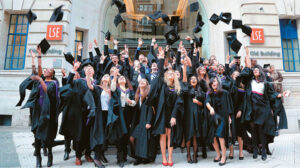More than the power of knowledge, probably, is the knowledge of the power that binds together, generally in lifelong bonds, the people of the London School of Economics (LSE). For LSE is a wholly idiosyncratic case among the world’s leading universities, a category of excellence in which it rightly ranks.
On the one hand, LSE has long been identified with scientific pioneering, while at the same time functioning as an ark of learning that has thrown an anchor back in time, with an almost obsessive faith in the principles of the Enlightenment and the pursuit of total humanistic betterment through intellectual achievement. But the feature that makes LSE stand out is above all that it constantly reproduces and strengthens what is today dubbed “networking”, but in reality is a sense of belonging, inclusion, and lifelong participation in a community that is both closed and at the same time universal.
This is the community of those who are in any way involved with the London School of Economics, beyond degrees, masters and PhDs, PhD chairs, or anything related and formal. At LSE, admittedly, and for several reasons, both educational and material, it is by no means easy for anyone to be admitted and to study. But if he passes through the gate of the campus, in essence, he never leaves, he is never cut off. Besides, it is significant that the number of registered members of the Hellenic LSE Alumni Association has exceeded 4,000 since 1980 to date.
Studies and fees
A relatively young university (founded “only” in 1895, whereas, say, Oxford was founded in the 11th century), relatively small – since it has no core faculties such as Medicine, Architecture, Engineering, or even Computer Science, LSE has nevertheless led some 20 of its own scientists to the Nobel Prize. The last Nobel for their achievements in the science of economics was awarded jointly to two LSE staff members, Daron Ajemoglou and James Robinson.
Darron Darnan and Darren Robinson were awarded the prize for their work.
Also, over 40 political leaders, from John Fitzgerald Kennedy (JFK) to Ursula von der Leyen, Kostas Simitis, and Giorgos A. Papandreou have been LSE students. From the notorious big investor George Soros to archetypal rock star Mick Jagger (even though he gave up his studies early to become the frontman of Rolling Stones), more than 240,000 people from 146 countries around the world have at various times benefited from LSE’s unique approach to higher education.
LSE rightly boasts that 93% of its graduates, within 15 months of their graduation ceremony, are either immediately accepted for postgraduate study or find direct employment. And that at an average annual salary of 43,000 euros.
.
The LSE is, of course, equally proud of the highly effective and multi-dimensional “networking” that, as a perk bonus with graduation, students automatically gain. This networking, valuable and sought-after, is achieved precisely through the dozens of national associations of its graduates around the world. Among these is the LSE’s Greek community, a circle of individuals with a concentrated power of influence infinitely multiplied by its numerical size, which helps in understanding the wider “London School of Economics phenomenon”.
The prominent Greeks
A rough short list of some of the most prominent Greek graduates of the London School of Economics would include the two former prime ministers Kostas Simitis and George Papandreou, at least one serving minister, Nikos Dendias, as well as the former “czars” of the economy Giorgos Alogoskoufis and Giorgos Papakonstantinou.
And, certainly, some of the most iconic figures in business, such as Marianna Latsis and Spyros Latsis, Evangelos Mytilinaios, Athanasios Laskaridis, Telis Mystakidis, and many, many more professionally successful Greeks.
And if Greek Cypriots Stelios Hadjiyannou and Christoforos Pissaridis, Nobel Prize-winning economics professor, then already the informal Top-15 or anything similar proves too narrow and limited, even for an indicative list of those Greeks and Cypriots who have occasionally passed from the LSE benches to go on to excel in the field in which each chose to operate.
For example, if one limits oneself to executives and associates of the current government, the Deputy Minister of Research and Technology Christos Dimas is an LSE graduate. So is Professor Andreas (Antricos) A. Papandreou, the young PASOK MP Manolis Christodoulakis, as well as journalists, high-ranking executives of public organizations and private companies, etc.
However, given that the Greek element plays a prominent and organic role in the context of the higher education provided by LSE, mainly thanks to the Hellenic Observatory Centre for Research on Contemporary Greece and Cyprus, the university’s links with Greeks should be analyzed in a broader light, not just focusing strictly on its literal alumni.
For example, Giannis Stournaras, Gikas Hardouvelis, Loukas Papademos, Georgios Provopoulos, Theodoros Karatzas, Nikolaos Garganas, and Spyros Filaretos, among several others, all of have had a key contribution in shaping the economic and political reality in Greece in the last two decades.
Each of them as a minister (and prime minister of a caretaker government, indeed, in the case of Papademos), having served as a governor of major banking institutions in Greece and abroad, and so on, share something in common: membership of the advisory board of the Greek Observatory at the London School of Economics.
The member of the Board of Governors of the London Economics School.
The member of the Advisory Board of the London School of Economics at the London School of Economics.
The same board includes LSE professors such as Elias Mosialos, who was the driving force behind the establishment of the Greek Observatory, the brilliant scholar of contemporary Greek politics Kevin Featherstone, as well as some of the aforementioned alumni, such as Spyros Latsis, Evangelos Mytilineos, Athanasios Laskaridis, etc.
And if the circle of Greeks at LSE is widened even further, to include current and former lecturers, regular or visiting, then personalities such as Foreign Minister George Gerapetritis, Deputy Minister of Labour and Social Security Panos Tsakloglou, former ministers and deputy ministers Yiannos Papantoniou, Nikos Christodoulakis, Louka Katseli, Ioannis Valentinakis, Professors Stathis Kalyvas, Marilena Simitis, Antigoni Lymperaki, and Thanasis Diamantopoulos – in a list of names that seem endless, but is necessarily only indicative.
The knowledge exchanges
Kostas Karamanlis, Giorgos Papandreou, and Alexis Tsipras, as well as Kyriakos Mitsotakis in 2017, before taking office, they are four of the Greek prime ministers who were invited, relatively recently, by the LSE’s Greek Observatory to give their take on each of their perceptions of the country’s political, social and economic situation, usually speaking to packed auditoriums.
In addition to the aforementioned, personalities from the forefront of the domestic political scene such as Dora Bakoyannis, Adonis Georgiades, Anna Diamantopoulou, Euclid Tsakalotos, Giannis Boutaris, but even the Ecumenical Patriarch Bartholomew or Paul Thomsen as a representative of the lenders’ troika gave their views in person on various aspects of the economic crisis affecting Greece, as the Observatory dramatically increased its activity, especially in the period 2009-2019, due to the interest of the Greek case during the memorandum era from the perspective of the social sciences and the particular perspective of the LSE.
The Hellenic Observatory Centre, as part of the LSE’s European Institute, has developed into the navel of the Greek presence, a center for specialist study, research, and the production of original work, such as the highly interesting essay ‘Greek Prime Ministers, The Paradox of Power’, written by Kevin Featherstone, director for 22 years (2002-2024) of the Hellenic Observatory.
.
Incidentally, Professor Featherstone, apart from being considered a world authority in the field of Modern Greek Studies, has been honored repeatedly in Greece for his scholarly work and has also taken the oath of Greek citizenship before Prime Minister Kyriakos Mitsotakis, accepting Greek citizenship.
“Eleftherios Venizelos”
Featherstone, who remains a researcher at the Hellenic Observatory and continues to produce studies on the management of the Greek crisis, was succeeded by Professor of Political Economy and holder of the “Eleftherios Venizelos” chair, Vassilis Monastiriotis. As for the Observatory itself, it owes its existence to Ilias Mosialos, who had the idea for its establishment in 1992.
It was he who took the initiative to propose to the LSE administration that it be established as a relatively autonomous center focused on Greece. The plan was approved, then funding was secured thanks to the actions of Professor Mosialos, mainly through donations from Greek banks, and finally, the Hellenic Observatory was born in 1994. Elias Mosialos was the first person in charge of its operation, before giving his position to another Greek academic, Professor Loukas Tsoukalis.
The mission of the Hellenic Observatory, within the LSE, is to promote Greek studies by organizing regular events in London, Greece, and Cyprus. By approaching various aspects of contemporary Greek history, it creates a ferment of ideas and scholarly dialogue, in collaboration with Greek universities, political figures, etc. Indirectly, the country benefits from its visibility and keeping it in the news – especially, of course, when it is not of concern to social scientists because of its internal problems.
A Greek “parish”
The Greek Observatory, during its 30 years of operation, has rallied and systematized the LSE’s Greek-centric interest. But even before its inception, the LSE willingly gave a platform to Greek academics and politicians who denounced the colonial junta to the international community.
A typical case in this respect was the visit of Andreas Papandreou in February 1968. The future founder of PASOK and prime minister of Greece was on the front page of the Beaver, a publication published by the LSE students’ union.
The photograph of the 49-year-old Papandreou, then a professor of economics at universities in the US, Sweden, and Britain, was accompanied by a text which, among other things, stated that “Professor Andreas Papandreou, son of former Prime Minister George Papandreou, attended the reception organized in his honor by the Hellenic Society at the Shaw Library. In a short speech, Papandreou expressed his appreciation for the efforts made on his behalf during his imprisonment by the dictatorial regime in Greece.
However, he stressed emphatically that the military junta had no solid foundations and that he was hopeful that the breakdown of democracy would not develop into a permanent situation. He called on Greeks who had fled their homeland not to remain indifferent to what was happening in Greece, with the persecution of politicians, intellectuals, etc. Responding to a question from the audience, Professor Papandreou explained that while many governments may have officially recognized the junta, this does not mean that the power that the colonels seized in their coup is recognized as legitimate.”
Greeks at the London School of Economics have their history, but it has not yet been systematically recorded in its entirety – especially before 1980 when the LSE Greek Alumni Association was founded. As a result, we do not know, for example, who the first Greek student was, and tracing him would require a special search of the university’s registers.
It is not clear, however, who took the initiative for the creation of the Greek Alumni Association – although, as the honorary president, Maria Xytaki, tells THEMA, Mr. Yannis Plattsidakis played a leading role in the initial phase of the Association. The well-known shipowner, distinguished as one of the 100 most influential people in the shipping industry by Lloyd’s List, is a founding member of the LSE Greek Alumni Association and its long-time president – from 1981 to 2005. He was also a member of the Advisory Board of the Greek Observatory, from 1997-2006.
In 2006, the presidency of the Association was taken over by the lawyer Dimitris Paraskevas, who drafted a constitution under which the term of office of the head is two years and can only be extended by re-election for a further two years. Membership of the Hellenic Association is automatically granted to all LSE graduates – although the right to vote requires that they have not neglected to pay the prescribed fee of 30 euros per year.
The LSE Greek Alumni Association, the largest and most powerful in its category in terms of membership (over 4,000 people), recently held elections for a new administration. The outcome of the elections was the renewal of the mandate of Mr. Thodoris Kalambokis, a businessman and former candidate for the European Parliament with New Democracy as President for the next two years.
As far as its activities are concerned, apart from events of reflection and dialogue, in the margins of which distinguished members such as Sir Stelios Hatziiiannou, etc. are usually honored, perhaps the most important contribution of the association is the creation of a think tank, a reservoir of ideas and reflection on the wider social affairs of today’s Greece.
The processes of the think tank have produced a series of texts, and scientific papers categorized as “position papers”, which reflect LSE’s methodology and perception on issues related to economics, politics, public administration, digitalization, technology, etc., while allowing young graduates to apply their knowledge in the drafting of specialized studies.
The possibility of using the knowledge gained in the field of economics and technology to develop professional skills in the field of professional development.
This material is provided free of charge by the Hellenic Association of LSE Alumni to the relevant government departments, in the hope that it will be useful for the qualitative upgrading of the public sector in our country. Actions such as this are highly appreciated by the LSE administration, hence the former president of the Hellenic Association Maria Xytaki was the first to receive the Outstanding Voluntary Contribution Award in 2017, from the then Dean of the university, Baroness Minoe Safik, one of the world’s leading economists.
Bill Clinton: This is the LSE
Among the stars of international politics, science, technology, and so on who have been occasionally hosted on panel discussions at the LSE, it was perhaps former US president Bill Clinton who managed to encapsulate the essence of what the London School of Economics and Political Science stands for. He, of course, was not himself a student there – unlike Monica Lewinsky, the protagonist of a scandal that forever tarnished Clinton’s reputation. Lewinsky completed a master’s degree in psychology at LSE, albeit somewhat belatedly, in 2007, about a decade after the scandal that rocked the White House broke.
However, in 2001, on one of his two visits to the LSE as a VIP guest, Bill Clinton was the target of sharp banter from one of his hosts and interlocutors. Specifically, Professor Meghnad Desai picked on Clinton, pointing out that “Mr. President, in your career you made two big mistakes: the first was that you chose to study at Oxford instead of LSE.
The second mistake was that you also sent your daughter as a student to Oxford.” Clinton responded “I may make up for those mistakes tonight. The London School of Economics was for me a mythical place in my imagination. It was here that President Kennedy, JFK, studied in the summer of 1935, at the height of the controversy between the LSE and Cambridge schools over the analysis of the laws governing the world economy, that is, between Professors Friedrich Hayek and John Maynard Keynes respectively.
These two giants changed the way people perceived the world. Also, another LSE student, Mick Jagger, changed the world in his way. He disregarded the advice of a professor who told him he wasn’t going to make money from music.” Clinton went on to rant about the LSE, pointing out that “for a very long time, all of humanity has expected the LSE to provide it with the scientific tools to understand each new era that has dawned.”
Friedrich Hayek, whom Bill Clinton cited in recalling his titanic duel with John Maynard Keynes from the 1930s and almost indefinitely since, is one of LSE’s Nobel laureate professors. He shares the institution’s pantheon with 19 other scholars, the vast majority of them economists, who were selected for the highest distinction by the Swedish Academy.
Among them, one meets real legends, such as one of the founders of the LSE, George Bernard Shaw (Nobel Prize for Literature, 1925), the philosopher Bertrand Russell (Literature, 1950), Sir John Hicks (Economics, 1972), and later Paul Krugman (Economics, 2008), Christopher Pissarides (Economics, 2010) and others. While this is typically the LSE, its stamp has marked schools of thought beyond economics, even in entirely theoretical subjects such as philosophy of science, with scoops from the great thinkers Carl Popper and Imre Lakatos.
The costs and benefits
In the shadow of such giants of thought, Greek students – and somewhat proportionally Greek lecturers – have over time made their presence felt more and more in the bosom of the LSE. And whereas until the early 1990s, the Greeks who were part of the LSE’s teaching/research staff could be counted on the fingers of one hand, today they represent a very considerable group, consisting of about 30 university teachers.
They also contribute to the glamour and fascination that surround the London School of Economics for thousands of students from all over the world – and among them undoubtedly a large number of young Greeks – who envision their studies at the famous LSE. The best university in London and Britain (according to the ranking of the “Sunday Times” and the “Guardian”) and 6th in the world in the field of Social Sciences.
In practice, around 70 Greek first-year students enroll at LSE every year, and indicatively, in the academic year 2022-2023, the LSE community would total over 12,000 people, divided almost equally between undergraduate and postgraduate students. It goes without saying that after Brexit, the cost of attendance made any ambition to do so prohibitive for those families who could not afford to pay annually around €60,000 in total to cover their children’s tuition fees and accommodation in London.
The forced adjustment to LSE’s pricing policy due to Brexit has almost quadrupled the cost of attending. Anyway, there is always the option of claiming one of the many scholarships that secure a student place for A’s but not B’s, as well as the facilities provided by the university itself, the possibility of paid employment within LSE in ancillary or even manual work, etc.
“I learned a lot at the London School of Economics, which helped me to understand the complex social and economic reality and the developments of our world in recent decades”, Marianna Latsis stated in 2022 in a speech at the ceremony of her award by the LSE Greek Alumni Association for her continuous charity work.
Mrs. Latsis, stating that “I learned a lot from our enlightened professors, who allowed me to observe and understand the complex business environment in which our multifaceted group operates”, implicitly referred to something very important: the LSE approach to knowledge, an element of educational DNA that acts as a compass and a magnet at the same time, shaping a specific collective character, especially among its graduates.
30 lectures a day
This is created, to a large extent, through the special osmosis in the teaching process, as the attendance there goes beyond the subject matter in question. Every day there are 20-30 lectures on any subject, freely available to all students, while in the lecture halls, the lecturers are obliged to present the most advanced in scientific research.
The numerous and varied seminars, as well as the evaluation of students, which is not limited to the written final examinations, but is carried out throughout the academic year, are also in the same direction. In addition, reverse evaluation, from students to lecturers, is provided for and is taken seriously.
Of course, several of these are not exclusive to the LSE. However, unlike most peripatetic universities of the Harvard, Oxford, Cambridge, MIT, etc. types, the London School of Economics exerts an almost irresistible centripetal pull on an extended number of individuals, who go from being students to becoming lecturers, or members of boards overseeing research projects, or even sponsors.
Their attributes may change, but the people themselves always remain within LSE’s reach. After all, LSE’s programmatic and fundamental ambition is that no one leaves its campus with only one title for their professional resume – no matter how coveted. The ideal is to remain in interaction with LSE, ceaselessly seeking the rerum cognoscere causas, the true meaning before the three words in its coat of arms, the knowing of the cause of things that happen around you.
Ask me anything
Explore related questions





